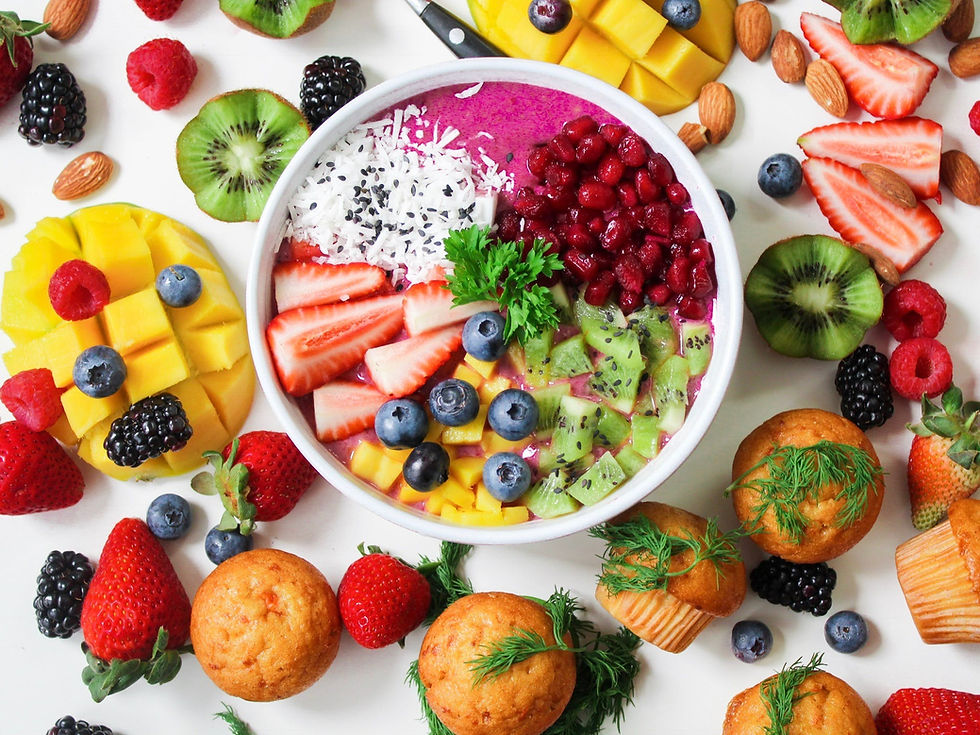Nourishing Your Gut: A Guide to a Healthy Microbiome
- Rebecca

- Jan 24, 2024
- 3 min read
Imagine your gut as a lively garden, and the food you eat as the magical fertiliser that helps it bloom and flourish. Everything you eat comes into contact with your gut microbiome, the collection of bacteria, yeast and fungi in your gut, and can have a direct impact on the health of your gut. In this article we will focus on the key foods for good gut health.

1. Fibre-Rich Foods: The Foundation of a Gut-Healthy Diet
Why It Matters: Fibre is vital to support a healthy digestive system, helping food to move through the gut and stay regular. This is important to ensure waste is excreted properly from your diet.
Actionable Tip: Include a variety of fruits, vegetables, whole grains, and legumes in your daily meals. For breakfast, try a bowl of oatmeal topped with berries and nuts. For lunch, opt for a colourful salad with mixed greens, veggies, and quinoa. Snack on crunchy vegetables with hummus to boost your fibre intake.
2. Probiotic Powerhouses: Fermented Foods
Why It Matters: Probiotics are beneficial bacteria that support a balanced gut microbiome. Including these foods in your diet can enhance the population of good bacteria and improve gut health.
Actionable Tip: Incorporate fermented foods like yogurt, kefir, sauerkraut, and kimchi into your diet. For breakfast, enjoy a yogurt parfait with granola and fresh fruit. For a savory lunch, add a side of kimchi to your rice bowl or incorporate sauerkraut in your sandwiches.
3. Prebiotics: Fuel for Good Gut Bacteria
Why It Matters: Prebiotics are non-digestible fibre that act as fuel for beneficial bacteria in the gut, promoting their growth and activity.
Actionable Tip: Add foods rich in prebiotics to your meals. Include garlic in your stir-fries, onions in your salads, and asparagus as a tasty side dish. For a simple yet effective prebiotic boost, sprinkle flaxseeds on your yogurt or oatmeal.
4. Colourful Fruits and Vegetables: A Rainbow of Nutrients
Why It Matters: The vibrant colours in fruits and vegetables signify a diverse range of nutrients that are not only beneficial for you but also support a healthy gut environment.
Actionable Tip: Aim for a diverse range of colourful produce to provide essential vitamins and antioxidants. Create a smoothie bowl for breakfast with a mix of berries, spinach, and banana. For lunch, make a roasted vegetable medley with sweet potatoes, broccoli, and bell peppers.
5. Omega-3 Fatty Acids: Good for Your Heart and Your Gut
Why It Matters: Omega-3s have anti-inflammatory properties that can positively impact the gut environment, contributing to overall gut health.
Actionable Tip: Include fatty fish like salmon or mackerel in your diet. For a plant-based option, add flaxseeds or chia seeds to your smoothies or salads.
6. Limit Processed Foods and Added Sugars
Why It Matters: Processed foods and excessive sugar can negatively impact the balance of gut bacteria, leading to an unfavourable gut environment.
Actionable Tip: Opt for whole, unprocessed foods. Prepare homemade meals with fresh ingredients. Replace sugary snacks with fresh fruits or a small handful of nuts. For a satisfying dessert, try a fruit salad with a drizzle of honey.
7. Stay Hydrated: Water, the Elixir of Life for Your Gut
Why It Matters: Proper hydration is essential for maintaining a well-functioning digestive system. Water helps in the breakdown of food and the absorption of nutrients.
Actionable Tip: Drink plenty of water throughout the day. Infuse water with slices of cucumber, mint, or citrus fruits for added flavour. Herbal teas are also a good option for staying hydrated while providing additional health benefits.
Incorporating these gut-friendly foods into your meals doesn't have to be complex. By planning and preparing delicious, nutrient-packed meals, you'll be supporting your gut health and overall well-being. Remember to enjoy the process and savour the flavours of a diverse and gut-friendly diet!



Comments